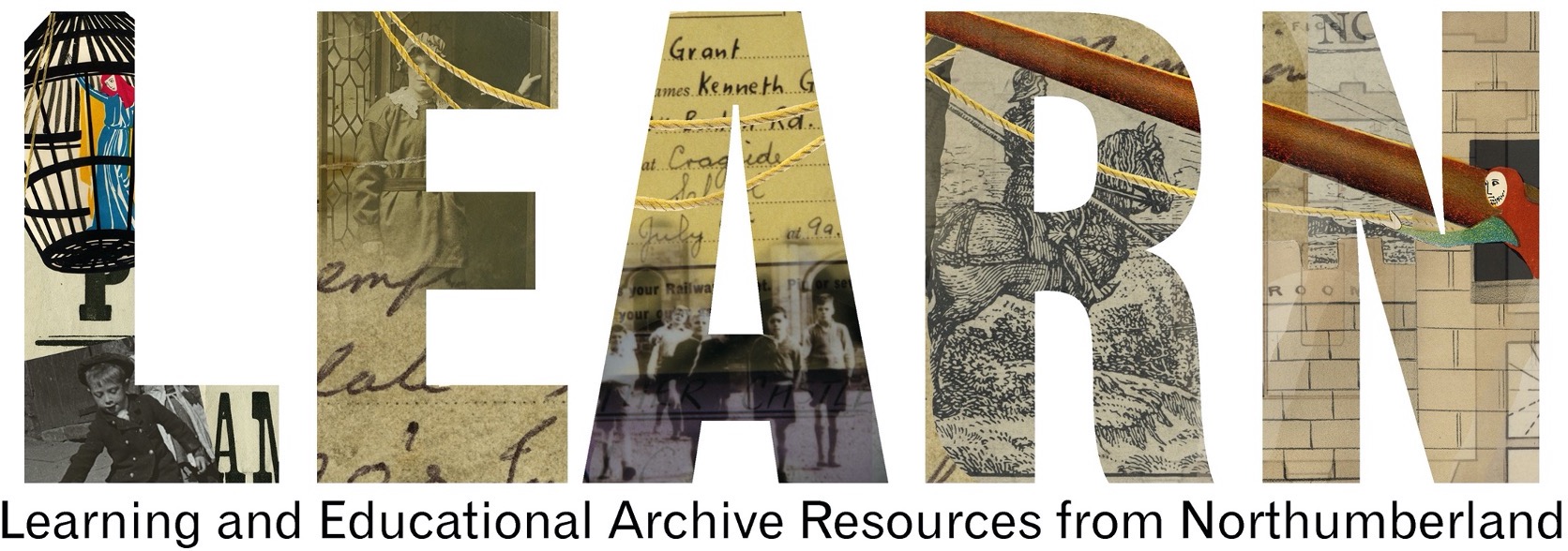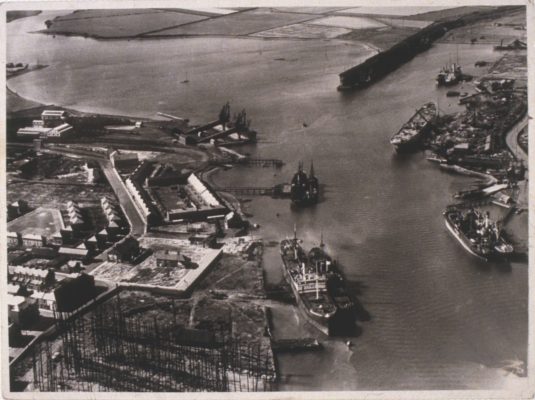Bombing of Blyth Oral Histories – Belle S
Reference: T/464, NRO 5525/07/08
Suggested age groups: KS1, KS2, KS3, KS4, Lifelong Learners
Subject areas: WW1, WW2, Air Raids, Bombing of Blyth
Download Word Document
Download PDF
The photograph of Blyth Harbour has been provided by Blyth Harbour Commission.
Belle S – T/464 – Part 1
Belle S – T/464 – Part 2
CONTEXT
These sound files are extracts (short edited pieces) from longer oral history interviews preserved by Northumberland Archives. These interviews were made as part of a project to collect the memories of people who lived on the Northumberland coast.
For each person there is a short extract where they introduce themselves and other extracts where they talk about their experience of the bombing of Blyth during the Second World War.
Belle talks about being born at home in 1914, just before the start of the First World War. Belle was born a twin and had an elder brother and sister. Her family had a live-in maid in their house. Her nurse lived in the family house for a month after she and her twin were born. Belle mentions that her parents were advised to retreat from the coastal area into Morpeth as a precaution during the First World War, but her parents chose not to relocate. She mentions the defences on the beach and a zeppelin flying over the area looking for the iron works and that to her as a child it looked like a long balloon.
Belle describes the damage caused to her father’s chemist shop in the bombings during the Second World War. She also talks about the fact that there were few doctors and that miners paid 1 pence per week so that they could see a doctor. Not many saw a doctor, but that many saved this up.
ACTIVITIES
ACTIVITY 1
Background
Belle talks about being born at home in 1914, just before the start of the First World War. Belle was born a twin and had an elder brother and sister. Her family had a live-in maid in their house. Her nurse lived in the family house for a month after she and her twin were born. Belle mentions that her parents were advised to retreat from the coastal area into Morpeth as a precaution during the First World War, but her parents chose not to relocate. She mentions the defences on the beach and a zeppelin flying over the area looking for the iron works and that to her as a child it looked like a long balloon.
SEE
See: When was Belle born?
See: Where did Belle live?
See: What major world event was about to begin when Belle was born?
See: How many wars did Belle experience in Blyth?
See: Why were Belle’s parents advised to relocate during the First World War?
See: Where were Belle’s parents advised to relocate to during the First World War?
See: What happened to Belle’s father’s chemist shop during the Second World War?
THINK
Think: Why were Belle’s parents advised to relocate from Blyth to Morpeth during the First World War? You could use a map of Blyth and Morpeth to help you.
Think: Why might Belle’s parents have chosen not to relocate to Morpeth during the First World War?
Think: What impression do you have of Belle’s family? Why?
Think: How might Belle’s experience have been different during the First World War and the Second World War?
Think: What is a zeppelin?
Think: Why might a zeppelin have been flying over Blyth?
DO
Do: Draw an image from Belle’s perspective, looking at the zeppelin from the bedroom window.
Do: Write a newspaper article reporting the arrival of the zeppelin over Blyth.
Do: Write two diary entries from Belle’s perspective. The first set during WW1 after the zeppelin attack; and the second set during WW2 after the bombing which damaged her father’s chemist shop.
Do: Create a presentation comparing the different ways that Blyth was targeted during the WW1 and WW2. Was there a difference in how Blyth was attacked and the frequency that it was attacked?
Do: Write a radio news broadcast reporting on the bombing of Blyth during WW2.
Resources
ACTIVITY 2
Background
Belle mentions the defences on the beach and a zeppelin flying over the area looking for the iron works and that to her as a child it looked like a long balloon.
Belles describes the damage caused to her father’s chemist shop in the bombings during the Second World War.
SEE
See: What types of defenses does Belle mention?
See: What types of attacks does Belle mention?
See: What type of bomb damage does Belle mention?
See: What happened to Belle’s father’s chemist shop?
THINK
Think: What led to areas being targeted for air raids during the war? You could think about the geographical, environmental and industrial features of areas that were bombed.
Think: Why do you think Blyth was bombed during the war? You could use a map of Blyth to help you identify Blyth’s geographical, environmental and industrial features.
Think: Why did Blyth have defences on the beach?
Think: Which other areas in the North of England do you think were targeted during air raids and why?
DO
Do: Look at the data gathered by the War, State and Society Bombing Britain website, can you sort the data so that you can only see the bombings that took place in the North of England?
Do: Using the data from Bombing Britain, create a map showing the places that were bombed in the North of England.
Do: Using the data from Bombing Britain, create a table showing the bombings that took place in the Blyth area.
Do: Using the data from Bombing Britain, create a table showing the number of casualties that occurred as a result of bombings in Blyth.
Do: Use the information from the North East Diary 1939-1945 website’s places index to find some locations in Blyth that suffered bomb damage.
Do: Use Google Maps to look at the present-day locations in Blyth that suffered bomb damage. Can you see any evidence of these areas being restored? How different do you think they look now compared to how they looked during WW2?
Do: Imagine you have been asked to redevelop an area of Blyth that sustained bomb damage. Create a drawing showing how you would design the redevelopment.
Resources
ACTIVITY 3
Background
These sound files are extracts (short edited pieces) from longer oral history interviews preserved by Northumberland Archives. These interviews were made as part of a project to collect the memories of people who lived on the Northumberland coast.
For each person there is a short extract where they introduce themselves and other extracts where they talk about their experience of the bombing of Blyth during the Second World War.
SEE
See: Why were these oral histories recorded?
See: Who took part in these oral history interviews?
See: What is included in the oral history extracts?
THINK
Think: What is an oral history?
Think: Why is it important to record oral histories?
Think: What is the value of oral histories?
Think: Who might use oral histories?
Think: How reliable are oral histories?
Think: What types of oral histories might be recorded?
DO
Do: Imagine you are about to interview someone who experienced the bombing of Blyth for an oral history. Write down a list of questions or talking points that you might use to prompt them during the interview.
Do: Write down a list of events that have taken place during your lifetime that you think it would be important to create oral history records of.
Do: Write down a list of events that have taken place before your lifetime that you think it would be important to have oral history records of.
Do: Look at the British Library, British Library Sounds and Imperial War Museum websites. Can you find oral history recordings about the events from your lists?
Do: Think of an event that you have experienced first-hand. In pairs, interview each other about your chosen events and create oral history recordings.
Do: Imagine you are Belle, choose one part of her oral history interview and write a diary entry from her perspective of one of the events she describes.
Resources
OTHER ONLINE RESOURCES
BBC Peoples War website, page with memories of Blyth: https://www.bbc.co.uk/history/ww2peopleswar/stories/00/a6825800.shtml
Port of Blyth website, page about the history of the port: http://portofblyth.co.uk/history/
Air Raids
Imperial War Museum website, page about air raid preparation: https://www.iwm.org.uk/history/how-britain-prepared-for-air-raids-in-the-second-world-war
Imperial War Museum, page about what to do in an air raid: https://www.iwm.org.uk/history/what-to-do-during-an-air-raid
Imperial War Museum website, page with example of a “siren suit”: https://www.iwm.org.uk/collections/item/object/30097186
War, State and Society website, page with Bombing Britain database: http://www.warstateandsociety.com/Bombing-Britain
Blyth Beach Defences
Blyth Battery https://www.blythbattery.org.uk/
Simpson and Brown architects website, page about restoration of Blyth Battery: https://www.simpsonandbrown.co.uk/architecture/ruins-monuments/blyth-battery/
Historic England website, page about Blyth Battery: https://historicengland.org.uk/listing/the-list/list-entry/1021401
Oral History
Website for Oral History Society, includes definition of oral history: https://www.ohs.org.uk/
University of Leicester information sheet on oral history (pdf). Although the language isn’t the most accessible it does discuss value and reliability of oral histories: https://www.le.ac.uk/ur/emoha/training/no1.pdf
Website for Glasgow Women’s Library, blog discussing oral history project, includes definition: https://womenslibrary.org.uk/2017/08/09/what-are-oral-histories-and-why-are-they-important/
British Library website, page for oral history collections: https://www.bl.uk/collection-guides/oral-history
British Library Sounds website, includes oral history recordings: https://sounds.bl.uk/Oral-history
Imperial War Museum website page for oral history collections, one of the biggest oral history collections in the country. Many can be searched and listened to online: https://www.iwm.org.uk/collections/sound


